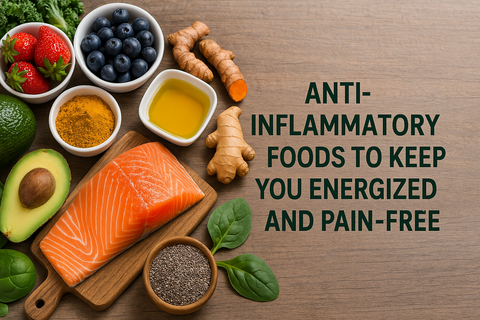Inflammation is your body's natural defense mechanism in response to injury or illness, crucial for initiating the healing process. However, when inflammation becomes chronic—persistent and ongoing—it can lead to significant discomfort such as fatigue, joint pain, digestive troubles, and contribute to chronic health conditions like arthritis, diabetes, cardiovascular disease, and even autoimmune disorders. The good news is that dietary choices have a profound effect on inflammation management, enhancing your overall health, vitality, and longevity.
Understanding Inflammation
Inflammation can be classified into two categories: acute and chronic. Acute inflammation is the immediate reaction your body has when faced with an injury or infection, characterized by redness, swelling, and pain, and is usually short-lived. Chronic inflammation, on the other hand, persists over extended periods, often due to ongoing immune system activation. This type of inflammation can silently damage body tissues and contribute to chronic diseases. Lifestyle factors such as unhealthy diet choices, stress, sedentary habits, and insufficient sleep significantly elevate the risk and intensity of chronic inflammation.
Anti-inflammatory Superstars

Incorporating anti-inflammatory foods into your diet consistently can markedly reduce inflammation, enhancing your energy levels, reducing pain, and boosting overall health. Below are some powerful foods known specifically for their robust anti-inflammatory properties:
-
Berries: Rich in powerful antioxidants like anthocyanins, berries help neutralize harmful free radicals, effectively reducing oxidative stress and inflammation throughout the body.
-
Leafy Greens: Vegetables such as spinach, kale, and Swiss chard are packed with essential nutrients like vitamins A, C, E, and K, minerals, and antioxidants known to combat inflammation.
-
Fatty Fish: Varieties like salmon, sardines, trout, and mackerel offer high levels of omega-3 fatty acids, recognized for their profound anti-inflammatory capabilities and heart health benefits.
-
Turmeric: This vibrant spice contains curcumin, a potent anti-inflammatory compound shown in numerous studies to decrease inflammatory markers and alleviate symptoms like joint pain and stiffness.
-
Ginger: Widely used in traditional medicine, ginger contains compounds that provide significant anti-inflammatory effects, particularly beneficial for digestive health and joint comfort.
-
Extra Virgin Olive Oil: Rich in oleocanthal, a compound that exhibits similar anti-inflammatory effects as non-steroidal anti-inflammatory drugs (NSAIDs), olive oil supports heart health and reduces systemic inflammation.
-
Avocados: Loaded with monounsaturated fats, fiber, and antioxidants, avocados aid in reducing inflammation and promoting cardiovascular and metabolic health.
-
Nuts and Seeds: Almonds, walnuts, flaxseeds, and chia seeds contain essential omega-3 fatty acids, fiber, and antioxidants that actively combat inflammation.
Foods to Limit or Avoid

Reducing or avoiding inflammatory foods can greatly enhance the effectiveness of an anti-inflammatory diet:
-
Processed Sugars: High sugar intake has been linked to increased inflammation, insulin resistance, and weight gain.
-
Refined Carbohydrates: Foods like white bread, pastries, and processed cereals cause rapid spikes in blood sugar levels, contributing significantly to inflammatory processes.
-
Fried and Processed Foods: Typically high in unhealthy fats and chemical additives, these foods can aggravate inflammation and damage overall health.
-
Processed Meats: Containing preservatives and nitrates, processed meats such as sausages and deli products can substantially heighten inflammatory responses.
-
Excess Alcohol: Regular heavy alcohol consumption can cause systemic inflammation, negatively impacting liver health and digestive function.
Easy Anti-inflammatory Recipes to Try

-
1 cup mixed berries (blueberries, strawberries, raspberries)
-
1 cup fresh spinach
-
½ ripe avocado
-
1 tablespoon grated fresh ginger
-
1 cup unsweetened almond milk
Blend all ingredients until smooth, enjoy immediately.

-
1 cup unsweetened almond or coconut milk
-
1 teaspoon turmeric powder
-
½ teaspoon cinnamon
-
Pinch of black pepper (improves absorption of turmeric)
-
1 teaspoon raw organic honey (optional)
Gently heat almond milk and whisk in turmeric, cinnamon, and black pepper until frothy. Sweeten with honey as desired.

-
Grilled or baked salmon filet
-
Mixed leafy greens (spinach, arugula, kale)
-
Fresh avocado slices
-
Cherry tomatoes
-
Olive oil and fresh lemon juice dressing
-
Chopped almonds, walnuts, or flax seeds for topping
Combine all ingredients, drizzle with dressing, sprinkle nuts or seeds, and serve fresh.
Lifestyle Tips for Reducing Inflammation
Dietary modifications are greatly enhanced by adopting certain lifestyle habits:
-
Stay Hydrated: Drinking sufficient water daily helps flush toxins and reduce inflammation.
-
Regular Exercise: Engage in moderate activities like walking, cycling, yoga, or swimming to naturally reduce inflammation.
-
Stress Management: Practice stress-relieving techniques such as mindfulness meditation, yoga, deep breathing exercises, or regular relaxation practices.
-
Prioritize Quality Sleep: Aim for 7-9 hours of restful sleep nightly to enable body recovery, regulate immune function, and decrease stress hormones that drive inflammation.
Conclusion
Managing inflammation through conscious dietary choices and lifestyle adjustments is a highly effective approach to enhancing your overall health. Incorporating anti-inflammatory foods into your daily routine and limiting inflammatory triggers can lead to greater energy, reduced pain, and a healthier, happier life.
NutriMix products offer convenient, nutritional solutions, supporting your anti-inflammatory lifestyle and aiding your journey to optimal wellness.
Subscribe to our newsletter for more healthful tips, nourishing recipes, and insights into vibrant living, and take control of your health today!



